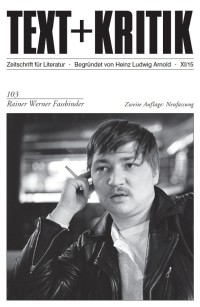Newsletter March 2016
These days we more often hear of cinemas that are closing than ones that are opening. This applies above all to art house cinemas. However, there has recently been a positive development in this respect in New York, where the newly opened Metrograph is providing a meeting point for the cinephile community, offering a movie theater along with a bookshop and a café. What makes the Metrograph special is the fact that it is not only focusing on historical film series but that it is presenting its ambitious program almost exclusively using 35 mm copies.
From April 22-28 a posthumous carte blanche for Rainer Werner Fassbinder is being presented (the precise program can be found at: http://metrograph.com/series/series/13/fassbinders-top-10). Ten works are being screened that Fassbinder named as his favorite films shortly before this death. His top ten includes, for example, Josef von Sternberg’s spy film DISHONORED, Nicholas Ray’s highly emotional Technicolor Western JOHNNY GUITAR, Pier Paolo Pasolini’s uncompromising THE 120 DAYS OF SODOM and Vasily Schukshin’s THE RED SNOWBALL TREE, which tells of the difficult resocialization of a former criminal and is little known outside the director’s homeland.
Two weeks prior to this, Annekatrin Hendel’s documentary FASSBINDER, which was coproduced by the RWFF, is also being screened in New York. Along with previously unpublished archival material, the documentary includes conversations with former Fassbinder colleagues such as Margit Carstensen, Wolf Gremm and Juliane Maria Lorenz about the time they spent with the director. Screenings are taking place on April 8 at 6 p.m. and April 9 at 2 p.m. in the Cinema Village. The documentary is being screened in the context of the Kino! festival of German film, which was renamed and shifted from MoMA to Greenwich Village two years ago. The director and cinematographer Martin Farkas will be present. More information is available on the festival website: http://www.kinofestivalnyc.com/schedule2016/.
Hanna Schygulla, who also appears in FASSBINDER, is featured in the current edition of the Süddeutsche Zeitung Magazine (SZ-Magazin). In the popular photo series “Sagen Sie jetzt nichts” (Don’t say anything), the actress and singer answers ten questions with pantomime, including, of course, one about her “life-defining” director. The “interview without words” can be found at: http://sz-magazin.sueddeutsche.de/texte/anzeigen/44306/Sagen-Sie-jetzt-nichts-Hanna-Schygulla.
Unlike colleagues such as Irm Hermann, Brigitte Mira, Karlheinz Böhm and Volker Spengler, Hanna Schygulla did not follow Fassbinder to Frankfurt’s Theater am Turm in 1974. Although RWF was artistic director there for only eight months, his turbulent season left a clear mark. His final production was supposed to the premiere of “Garbage, the City and Death” but it had to be cancelled due to protests (this is the subject of the recently published anthology “Der Müll, die Stadt und der Skandal” (Garbage, the City and the Scandal): http://www.fassbinderfoundation.de/der-muell-die-stadt-und-der-skandal/?lang=en).
On March 21 a new book dealing with the history of the theater, “Das TAT. Das legendäre Frankfurter Theaterlabor” (The TAT: The Legendary Frankfurt Theater Laboratory) is being published by Henschel Verlag (available at: http://www.seemann-henschel.de/Buch/9783894877859-Das-TAT). Before the TAT was forced to close in 2004 for financial reasons, it provided a platform for social-critical plays and new forms of staging. The publication includes numerous photos, archival material and poster designs. The book’s editors include Karlheinz Braun, the co-founder and longtime managing director of the Verlag der Autoren.
On April 14 at 7 p.m. the book is being presented in the Bockenheimer Depot. The actors Andreas Wellano and Angelika Sieburg will open the presentation by reading several excerpts from the book. This will be followed by a discussion between Heiner Goebbels, Hans-Thies Lehmann, Cornelia Niemann and Tom Stromberg based on the question “Who misses the TAT?” At the beginning of May there will be a further presentation in the Berliner Ensemble. The precise time and date are yet to be announced.
Another interesting publication has already come out: an updated edition of literature journal “TEXT+KRITIK” focusing exclusively on RWF. Since 1963 the editors have devoted each issue to a particular author from the German-speaking world. In Fassbinder’s case, the focus is, unusually, almost exclusively on his work in film. The texts contained in the issue deal with subjects that include the libidinal economy in BERLIN ALEXANDERPLATZ, the social utopia in EIGHT HOURS ARE NOT A DAY and a comparison with the filmmakers Fatih Akin and Oskar Roehler. The table of contents can be viewed and the issue ordered at: http://www.etk-muenchen.de/search/Details.aspx?sort=1&q=&ISBN=9783869164366.
In conclusion we would like to draw your attention to an upcoming cinema release. From April 7, Udo Kier, who worked several times with Fassbinder, can be seen in THE FORBIDDEN ROOM. In his quirky, poetic films, the Canadian director Guy Maddin revives the cinematic aesthetic of bygone days. This is also the case with his latest film, made in collaboration with Evan Johnson. Like a Russian doll, the film repeatedly adds new layers of lunatic narrative. The film’s website, which features a trailer, can be found at: http://theforbiddenroom-film.com/.
We wish all our readers and friends an exciting March and a restful Easter break.
More on the films of Rainer Werner Fassbinder:
http://www.fassbinderfoundation.de/filme-von-fassbinder/?lang=en
A list of selected stage productions by RWF:
http://www.fassbinderfoundation.de/theaterregie/?lang=en
Photo left: Cover of TEXT+KRITIK
Photo right: Udo Kier in THE FORBIDDEN ROOM, © Galen Johnson
